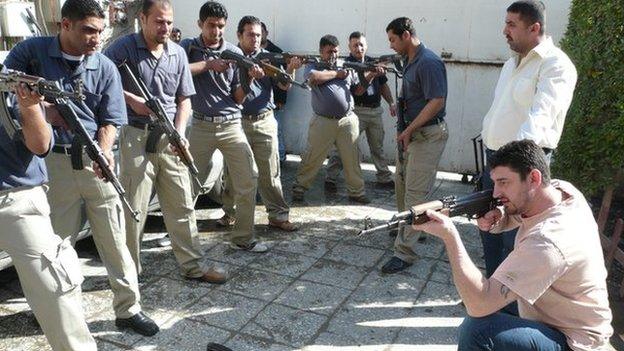Post-traumatic stress and the hired gun
- Published

The impact of Post Traumatic Stress Disorder on private security contractors is not known
Former SAS soldier Bob Paxman - who served in Iraq as well as other hostile environments - is one of a growing number of former servicemen who say they have suffered with the mental health condition Post Traumatic Stress Disorder (PTSD).
After a number of years in the military, Paxman retrained as a private security contractor, on protection contracts in Africa and Iraq.
He says as a result of being constantly in a dangerous environment and witnessing colleagues being killed and maimed he was diagnosed with PTSD.
The stress disorder is thought to affect up to 20% of military personnel who have served in conflict zones, according to research published by the National Center for PTSD in the US.
What is not known is the impact among those who work in the armed private security sector, many of whom are drawn from the military.
Yet the condition, says Paxman, led to him having flashbacks and becoming violent and paranoid.
"I was a danger to the public, a danger to myself," Paxman says.
"A danger to whoever was perceived as being the enemy."

Private contractors came under attack in places such as Fallujah in Iraq
Paxman says he would wake up several times a night with severe nightmares about incidents he was involved in through his military history and working in hostile environments.
"After a period of time, those nightmares crept into my daily life as well," Paxman says.
"I'd be trying to relax and a movie screen would come down and I'd start reliving the feelings and the images of things that had happened; traumatic incidents in the past."
As his mental health deteriorated, Paxman turned to drugs and alcohol. But through his own efforts, he says, his health gradually improved.
Appalled by what he saw as a lack of specialist help, he set up the charity, Talking2Minds, to help others suffering from PTSD.
Now, every year about 200 people come through his door looking for help, and the numbers are increasing.
But Paxman says he is now seeing more clients with mental health problems who work within the burgeoning private security sector.
Loose cannons
He points to the incident involving Danny Fitzsimons - who shot dead Scottish security contractor Paul McGuigan and another colleague in Iraq in 2009 while suffering from PTSD - as evidence that the condition is a very real risk factor for those working as private security contractors.
And, in his experience, he says, there are many private security contractors still working in the field who are failing to get the help they need.
"There's some people running around that really should not be working in a hostile environment.
"There's loads of loose cannons running around.
"Now I know that companies have started to close down on some of them. And a lot of people have been sent home. However, it's quite easy to go and jump into another company because there's a need."
Paxman predicts that the numbers coming through his doors, both from the military and the private security industry, will rise.
"Certainly we're going to see more numbers of people coming through with PTSD and severe stress-related conditions.
"We're going to see that because on average it takes around 14 years to come up with a diagnosis of PTSD, post service. And we've only been in Afghanistan for 10 years.
"I do believe it is timebomb waiting to go off."
In the past few weeks, one of the world's largest private security companies approached Paxman about running a pre-deployment pilot project.
It aims to identify and treat employees with severe stress related conditions such as PTSD.
"Once we've got these people, they'll be encouraged to come through our programme, and we'll be able to give them a clean bill of health," Paxman says.
BBC Scotland Investigates: Britain's Private War, BBC Two Scotland on Monday 1 October at 21:00 and soon after on the BBC iplayer.
- Published1 October 2012
- Published1 October 2012
- Published1 October 2012
- Published1 October 2012
- Published28 February 2011
- Published28 February 2011